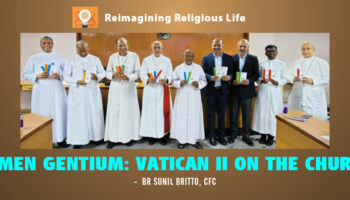For our cover story, we interviewed Fr Jerry Rosario SJ, who has donated blood a whopping 194 times—possibly the highest number in India! He has also been active in promoting blood and organ donation. Anyone who knows Fr Jerry will know his enthusiasm, simple life, commitment to helping people and spreading awareness about urgent human issues.—Editor
01 How did you get into blood donation and, eventually, also into promoting blood and organ donation?
Way back in 1972, when I had just completed my Jesuit Novitiate, I was called upon to donate blood to a poor rural youth by name Murugan who had lost a huge quantity of blood from continuous vomiting. A few days later, I learnt that my timely blood-gift had saved his life. Though this experience did make a deep personal impact on me, the turning point came with a missed opportunity.
Once, because of some urgent work, I could not go to the hospital to donate blood to Fr Coyle, an Irish Jesuit priest, who needed immediately a post-surgery transfusion. A professional donor took my place, but Fr Coyle died from transfusion-related complications. There and then, I vowed to seek chances to donate blood rather than wait to be asked.
By the way, science has advanced immensely so as to manufacture substitutes or alternatives practically for everything—but not for blood. That means when somebody dies due to non-availability of blood, the potential donors, in a way, have unconsciously and indirectly caused it.
What is the situation in our country? India stands in need of at least 12 million units of blood a year—at the time of medical surgery, delivery, emergency and calamity. Alas, it receives only 78 lakhs. We say, “The blood of the martyrs is the seed of our Faith.” Now we could add: Our faith that has grown “works only when we supply blood to others-in-need” (James 2:14-17).
You may remember that the year 2005 was declared as a Special Year of the Eucharist by Pope St. John Paul II. That year saw me releasing a book ‘This is My Body, This is My Blood,’ highlighting not only the Eucharistic life of Christ Jesus but also the Eucharistic human organ donations that we could possibly make, both before and after death.
In 2007, the Tamil Nadu-Pondicherry Catholic Bishops’ Conference, after a session of mine on this noble focus, issued a special Pastoral Letter to be read in all parishes of its region, exhorting human donations. In 2009, as a Creative Jesuit Ministry, the Dhanam Movement was registered to propagate and promote human donations. Dhanam is the Tamil rendition of daan (donation) in Sanskrit. The motto is that ‘all may have life and that, too, in fullness’ (Jn.10.10).
Over the years, the Dhanam movement has organized 450 camps and 630 conferences, big and small, both in urban and rural areas and institutions, to promote blood and organ donations. The awareness is picking up at an encouraging pace. But still, there are miles to go.
02 How many times have you donated blood? For whom?
If you had asked me this question some years back, I would‘ve by-passed it. Till I crossed 100 or so, I did hesitate to talk about my blood donation count. Then I was advised to speak about it so that others can also come forward. Up to May-2018, I have donated blood 194 times. Quite possibly I stand first in our country, having donated that number of FULL UNITS OF BLOOD (not just parts of blood, like platelets).
God has blessed me with one of the rarest blood groups, O-Rh Negative. Accordingly, out of all the donations I have made, sixty-seven were done at the time of delivery for the new-born babies, particularly when they were found affected by the incompatibility of blood groups of their parents. If so, they all are “blood of my blood,” my beloved children, so to say!
Another group was poor cancer patients. I donated my blood for them fifty-five times. It is always advisable to donate blood preferably to the patients at Government General Hospitals and to Red Cross Society and to the terminally-ill. Simple reason: Our blood can also be a “Good News to the poor,” who generally flock to the general hospitals. Moreover, the Government meets the expenses that are incurred for blood-tests before transfusion. That too benefits the last and the least (Mt.25.40)…
Fr Jerry Rosario SJ





